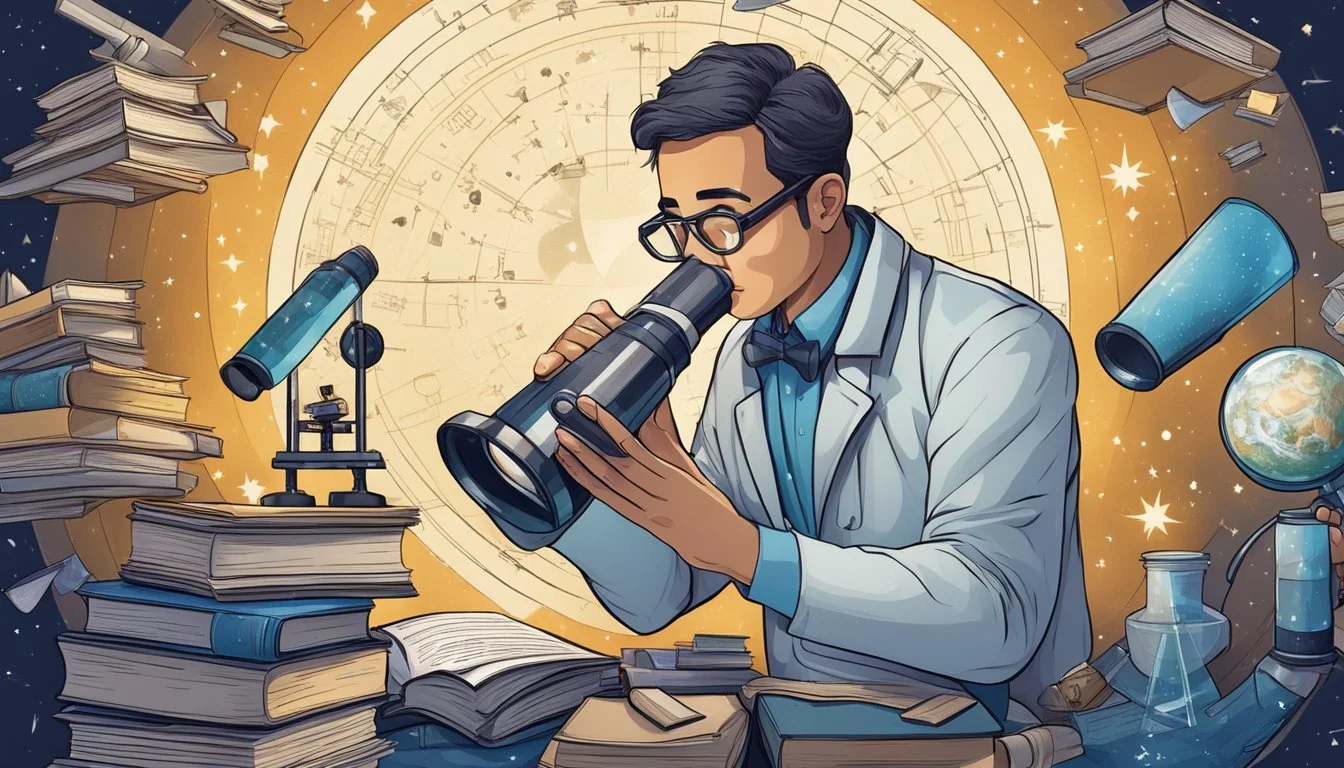8 Documentaries About Scientists Who Were Ahead of Their Time
Visionaries Who Shaped the Future
Science documentaries offer captivating glimpses into the lives and discoveries of visionary thinkers. These films showcase scientists who dared to challenge conventional wisdom and propose revolutionary ideas, often facing skepticism or opposition from their peers.
Documentaries about scientists ahead of their time provide valuable insights into the scientific process and the perseverance required to advance human knowledge. They highlight individuals whose groundbreaking theories or inventions were initially dismissed but later proved correct or influential. These films not only educate viewers about scientific concepts but also inspire future generations of researchers and innovators.
1) "Cosmos" by Carl Sagan
"Cosmos: A Personal Voyage" is a landmark science documentary series that first aired in 1980. Carl Sagan, a renowned astrophysicist, wrote and hosted this groundbreaking show.
The series explores a wide range of scientific topics, from the origins of life to the nature of the universe. Sagan's eloquent narration and ability to explain complex concepts made science accessible to a broad audience.
"Cosmos" consists of 13 episodes, each delving into different aspects of space, time, and human knowledge. It combines stunning visuals with Sagan's engaging commentary to create an immersive experience.
The show's impact was significant, inspiring a generation of scientists and science enthusiasts. It brought scientific thinking to mainstream television in a way that had never been done before.
In 2014, a follow-up series titled "Cosmos: A Spacetime Odyssey" was released. Hosted by Neil deGrasse Tyson, it built upon Sagan's original vision while incorporating new scientific discoveries.
https://en.wikipedia.org/wiki/Cosmos:_A_Personal_Voyage
2) "Particle Fever" featuring Peter Higgs
"Particle Fever" documents the groundbreaking search for the Higgs boson at CERN's Large Hadron Collider. The film follows six scientists, including theoretical physicist Peter Higgs, as they work to unravel fundamental mysteries of the universe.
Directed by Mark Levinson, the documentary captures the excitement and tension leading up to the historic 2012 announcement of the Higgs boson's discovery. It offers viewers a rare glimpse into the world of particle physics and the dedication of the researchers involved.
Peter Higgs, who theorized the existence of the particle in the 1960s, features prominently in the film. His presence adds a personal dimension to the scientific quest, highlighting the decades-long journey from theoretical prediction to experimental confirmation.
The documentary skillfully balances complex scientific concepts with human stories, making it accessible to both experts and general audiences. It showcases the collaborative nature of modern scientific research and the potential for transformative discoveries.
"Particle Fever" received critical acclaim for its engaging portrayal of cutting-edge physics and the scientists behind it. The film demonstrates how theoretical ideas can lead to real-world experiments with far-reaching implications.
[https://en.wikipedia.org/wiki/Particle_Fever]
3) "The Man Who Knew Infinity" about Srinivasa Ramanujan
"The Man Who Knew Infinity" chronicles the remarkable life of Srinivasa Ramanujan, an Indian mathematical prodigy. The film depicts Ramanujan's journey from Madras to Cambridge University in 1914.
At Cambridge, Ramanujan collaborates with renowned mathematician G.H. Hardy. Their partnership faces challenges due to differing approaches to mathematics. Ramanujan relies on intuition and natural genius, while Hardy emphasizes rigorous proofs.
The movie highlights Ramanujan's extraordinary ability to perceive mathematical patterns and relationships. It showcases his contributions to number theory and infinite series. The film also explores themes of cultural differences and the pursuit of knowledge.
Dev Patel portrays Ramanujan, capturing both his brilliance and struggles as an outsider in England. Jeremy Irons delivers a nuanced performance as Hardy, Ramanujan's mentor and collaborator.
"The Man Who Knew Infinity" sheds light on a mathematical genius whose work continues to influence modern mathematics. It celebrates Ramanujan's legacy as one of the youngest Fellows elected to the Royal Society.
https://en.wikipedia.org/wiki/The_Man_Who_Knew_Infinity_(film)
4) "Einstein's Universe" narrated by Peter Ustinov
"Einstein's Universe" is a captivating 1979 documentary that celebrates the centenary of Albert Einstein's birth. Narrated by the charismatic Peter Ustinov, the film offers viewers an engaging exploration of Einstein's Theory of General Relativity.
The documentary takes place at the University of Texas' McDonald Observatory. Here, a team of renowned physicists guide Ustinov and the audience through hands-on demonstrations of Einstein's groundbreaking ideas.
Written by Nigel Calder, the film brings complex scientific concepts to life in an accessible manner. It skillfully combines Ustinov's charming narration with expert explanations from leading scientists.
"Einstein's Universe" stands out for its ability to make intricate physics concepts understandable to a general audience. The documentary's use of practical demonstrations and clear explanations helps demystify Einstein's revolutionary theories.
This film serves as both an educational tool and a tribute to one of history's most influential scientists. It offers viewers a unique opportunity to grasp the fundamental principles that reshaped our understanding of the universe.
https://www.imdb.com/title/tt0079121/
5) "Tesla: Master of Lightning" on Nikola Tesla
"Tesla: Master of Lightning" explores the life and innovations of Nikola Tesla, the brilliant electrical engineer and inventor. This documentary sheds light on Tesla's groundbreaking work in electricity and magnetism.
The film highlights Tesla's most significant inventions, including alternating current and wireless technology. It also delves into his lesser-known contributions to fields like robotics and radar.
Narrated by Stacy Keach, the documentary features rare photographs and archival footage of Tesla. It offers insights into his complex personality and the challenges he faced in gaining recognition for his work.
"Tesla: Master of Lightning" examines the inventor's rivalries with contemporaries like Thomas Edison and Guglielmo Marconi. The film presents a balanced view of Tesla's successes and setbacks throughout his career.
This documentary aims to restore Tesla's reputation as a pioneering scientist whose ideas were often ahead of his time. It serves as a valuable resource for those interested in the history of electrical engineering and innovation.
IMDb - Tesla: Master of Lightning
6) "Hawking" about Stephen Hawking
"Hawking" is a compelling documentary that offers an intimate look at the life of renowned physicist Stephen Hawking. The film explores his groundbreaking scientific work and personal struggles with motor neuron disease.
Directed by Stephen Finnigan, the documentary features interviews with Hawking himself, as well as family members, friends, and colleagues. It provides unique insights into his brilliant mind and indomitable spirit.
The film covers Hawking's early life, his diagnosis at age 21, and his subsequent scientific achievements. It highlights his work on black holes, the Big Bang theory, and his quest for a unified theory of everything.
"Hawking" also delves into the scientist's personal life, including his marriages and role as a father. It showcases his sense of humor and determination to live life to the fullest despite physical limitations.
The documentary uses archival footage and photographs to illustrate Hawking's journey from a young student to a world-renowned scientist. It effectively balances scientific explanations with personal anecdotes.
7) "The Extraordinary Genius of Albert Einstein"
"The Extraordinary Genius of Albert Einstein" is a documentary that explores the life and scientific contributions of one of the most influential physicists in history. The film delves into Einstein's groundbreaking theories, including special and general relativity.
It examines how Einstein's work revolutionized our understanding of space, time, and the fundamental nature of the universe. The documentary highlights his ability to visualize complex concepts and his unique approach to problem-solving.
Einstein's personal life is also featured, including his early years, education, and relationships. The film discusses how his unconventional thinking and creative approach to physics set him apart from his contemporaries.
The documentary showcases Einstein's impact on modern physics and technology. It explores how his theories laid the foundation for many technological advancements we use today, from GPS systems to nuclear energy.
"The Extraordinary Genius of Albert Einstein" offers viewers a comprehensive look at the man behind the scientific breakthroughs. It presents Einstein not just as a brilliant scientist, but as a complex individual who changed our view of the cosmos.
[https://www.youtube.com/watch?v=0tDcP2hT4Ks]
8) "The Mystery of Matter: Search for the Elements"
"The Mystery of Matter: Search for the Elements" is a three-part documentary series that explores the history of chemistry and the discovery of the elements. The series premiered on PBS in 2015 and took ten years to produce.
The documentary focuses on seven key scientists who made significant contributions to understanding the basic building blocks of matter. It covers a wide span of history, from early alchemists to modern atomic researchers.
Each episode delves into the lives and work of these pioneering scientists. The series highlights their experiments, breakthroughs, and the impact of their discoveries on our understanding of the physical world.
"The Mystery of Matter" uses a combination of reenactments, expert interviews, and archival footage to bring these scientific stories to life. It aims to make complex scientific concepts accessible to a general audience.
The documentary showcases how the collective efforts of curious minds over centuries led to the development of the Periodic Table of Elements. It demonstrates the ongoing nature of scientific discovery and the human drive to understand the world around us.
https://en.wikipedia.org/wiki/The_Mystery_of_Matter
Pioneering Contributions to Science
Scientific documentaries highlight researchers who made groundbreaking discoveries that revolutionized our understanding of the world. These visionaries proposed ideas and developed technologies far ahead of their time, often facing skepticism from their peers.
Drastic Shifts in Scientific Understanding
Aristarchus of Samos, featured in some documentaries, proposed a heliocentric model in the 4th century BCE. This idea challenged the prevailing geocentric view and predated Copernicus by nearly 1800 years.
Galileo Galilei's observations with his improved telescope provided evidence for the Copernican system. His work, documented in films, laid the foundation for modern astronomy and physics.
Charles Darwin's theory of evolution by natural selection, explored in numerous documentaries, fundamentally altered biology. It explained the diversity of life and humanity's place in nature.
Innovations That Preceded Their Time
Ada Lovelace, often called the first computer programmer, wrote an algorithm for Charles Babbage's Analytical Engine in the 1840s. Her work, highlighted in science history films, anticipated modern computing by a century.
Nikola Tesla's alternating current (AC) system and wireless communication concepts were decades ahead of their time. Documentaries showcase his visionary ideas in electricity and radio technology.
Alan Turing's work on computational theory in the 1930s laid the groundwork for modern computer science. His concepts of artificial intelligence, explored in films, continue to influence technology today.
Impact on Modern Science
These documentaries showcase scientists whose revolutionary ideas and discoveries continue to shape contemporary research and inspire new generations of innovators.
Legacy in Today's Research
The work of pioneering scientists featured in these films forms the foundation of numerous modern scientific fields. Marie Curie's groundbreaking research on radioactivity laid the groundwork for nuclear physics and radiotherapy in cancer treatment.
Charles Darwin's theory of evolution remains central to biology and genetics. It informs studies on everything from antibiotic resistance to the development of new crop varieties.
Albert Einstein's theories of relativity underpin much of modern physics and astronomy. They're crucial for technologies like GPS and for understanding phenomena like black holes.
Inspiration for Future Generations
These documentaries serve as powerful motivational tools for aspiring scientists. They highlight the perseverance and creativity required to make significant breakthroughs.
Young researchers often cite these historical figures as role models. Many are inspired by the courage it took to challenge established ideas and pursue unconventional hypotheses.
The films also emphasize the importance of interdisciplinary thinking. They show how breakthroughs often occur at the intersection of different fields, encouraging students to explore diverse areas of study.
Educational institutions frequently use these documentaries to spark interest in STEM subjects. They help students connect abstract scientific concepts to real-world applications and human stories.






